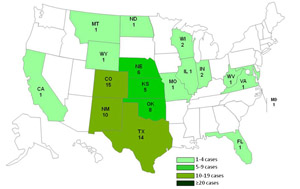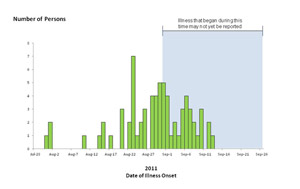Investigation Update: Multistate Outbreak of Listeriosis Linked to Whole Cantaloupes from Jensen Farms, Colorado
Reported to CDC as of 11am EDT on September 26, 2011
On this Page
Today's Highlights
- As of 11am EDT on September 26, 2011, a total of 72 persons infected with the four outbreak-associated strains of Listeria monocytogenes have been reported to CDC from 18 states. All illnesses started on or after July 31, 2011. The number of infected persons identified in each state is as follows: California (1), Colorado (15), Florida (1), Illinois (1), Indiana (2), Kansas (5), Maryland (1), Missouri (1), Montana (1), Nebraska (6), New Mexico (10), North Dakota (1), Oklahoma (8), Texas (14), Virginia (1), West Virginia (1), Wisconsin (2), and Wyoming (1).
- Thirteen deaths have been reported: 2 in Colorado, 1 in Kansas, 1 in Maryland, 1 in Missouri, 1 in Nebraska, 4 in New Mexico, 1 in Oklahoma, and 2 in Texas.
- Collaborative investigations by local, state, and federal public health and regulatory agencies indicate the source of the outbreak is whole cantaloupe grown at Jensen Farms’ production fields in Granada, Colorado.
- On September 14, 2011, FDA issued a press release to announce that Jensen Farms issued a voluntary recall of its Rocky Ford-brand cantaloupes after being linked to a multistate outbreak of listeriosis.
- CDC recommends that persons at high risk for listeriosis, including older adults, persons with weakened immune systems, and pregnant women, do not eat Rocky Ford cantaloupes from Jensen Farms. Other consumers who want to reduce their risk of Listeria infection should not eat Rocky Ford cantaloupes from Jensen Farms.
- Even if some of the cantaloupe has been eaten without becoming ill, dispose of the rest of the cantaloupe immediately. Listeria bacteria can grow in the cantaloupe at room and refrigerator temperatures.
- More information about listeriosis and recommendations to reduce the risk of getting listeriosis from food are available at CDC’s Listeriosis webpage.
- For more information on food outbreaks, please visit CDC’s Multistate Foodborne Outbreaks page.
Introduction
CDC is collaborating with public health officials in several states, including Colorado, and the U.S. Food and Drug Administration (FDA) to investigate a multistate outbreak of listeriosis. Listeriosis is a serious infection usually caused by eating food contaminated with the bacterium Listeria monocytogenes. Investigators are using DNA analysis of Listeria isolated from patients to identify cases of illness that may be part of this outbreak. The Listeria bacteria are obtained from diagnostic testing; pulsed-field gel electrophoresis (PFGE) is used to determine DNA fingerprint patterns. Investigators are using data from PulseNet, the national subtyping network made up of state and local public health laboratories and federal food regulatory laboratories that performs molecular surveillance of foodborne infections.
As of 11am EDT on September 26, 2011, a total of 72 persons infected with the four outbreak-associated strains of Listeria monocytogenes have been reported to CDC from 18 states. All illnesses started on or after July 31, 2011. The number of infected persons identified in each state is as follows: California (1), Colorado (15), Florida (1), Illinois (1), Indiana (2), Kansas (5), Maryland (1), Missouri (1), Montana (1), Nebraska (6), New Mexico (10), North Dakota (1), Oklahoma (8), Texas (14), Virginia (1), West Virginia (1), Wisconsin (2), and Wyoming (1). Thirteen deaths have been reported: 2 in Colorado, 1 in Kansas, 1 in Maryland, 1 in Missouri, 1 in Nebraska, 4 in New Mexico, 1 in Oklahoma, and 2 in Texas. Listeriosis illnesses in several other states are currently being investigated by state and local health departments to determine if they are part of this outbreak.
Among persons for whom information is available, illnesses began on or after July 31, 2011. Ages range from 35 to 96 years, with a median age of 78 years old. Most ill persons are over 60 years old or have health conditions that weaken the immune system. Fifty-eight percent of ill persons are female. Among the 67 ill persons with available information on whether they were hospitalized, 66 (99%) were hospitalized.
The outbreak can be visually described with a chart showing the number of persons who became ill each day. This chart is called an epidemic curve or epi curve. Illnesses that occurred after September 1, 2011, might not be reported yet due to the time it takes between when a person becomes ill and when the illness is reported. Please see the description of the steps in a foodborne outbreak investigation for more details.
About 800 cases of Listeria infection are diagnosed each year in the United States, along with 3 or 4 outbreaks of Listeria-associated foodborne illness. The foods that typically cause these outbreaks have been deli meats, hot dogs, and Mexican-style soft cheeses made with unpasteurized milk. Produce is not often identified as a source, but sprouts caused an outbreak in 2009, and celery caused an outbreak in 2010.
Investigation of the Outbreak
Ongoing collaborative investigations by local, state, and federal public health and regulatory agencies indicate the source of the outbreak is whole cantaloupe grown at Jensen Farms’ production fields in Granada, Colorado. Among the 59 ill persons with available information on what they ate, 55 (93%) reported consuming cantaloupes in the month before illness onset. Several ill persons remembered the type of cantaloupe they had eaten and said they were Rocky Ford cantaloupes, which are grown in the Rocky Ford region of southeastern Colorado. Source tracing of the cantaloupes that ill persons ate indicated that they came from Jensen Farms, and were marketed as being from the Rocky Ford region. These cantaloupes were shipped from July 29 through Sept 10 to at least 25 states with possible further distribution.
Laboratory testing by the Colorado Department of Public Health and Environment identified Listeria monocytogenes bacteria on cantaloupes collected from grocery stores and from an ill person’s home. Product traceback information from Colorado state officials indicated these cantaloupes also came from Jensen Farms. Laboratory testing by FDA has identified L. monocytogenes matching outbreak strains in samples from equipment and cantaloupe at the Jensen Farms’ packing facility in Granada, Colorado. FDA is working closely with CDC, the firms involved, and public health authorities in states where illnesses occurred to determine the exact cause of contamination.
CDC advises persons throughout the mainland United States who are at high risk for listeriosis, including older adults, persons with weakened immune systems, and pregnant women, to not eat Rocky Ford cantaloupes from Jensen Farms. Other consumers who want to reduce their risk for Listeria infection should not eat Rocky Ford cantaloupes from Jensen Farms.
Although Jensen Farms issued a voluntary recall of Rocky Ford cantaloupes on September 14, CDC expects that cases related to this outbreak may continue to be reported through October, because patients can develop listeriosis up to 2 months after eating contaminated food.
Clinical Features/Signs and Symptoms
Listeriosis is a serious infection caused by eating food contaminated with the bacterium Listeria monocytogenes. The disease primarily affects older adults, persons with weakened immune systems, pregnant women, and newborns. Rarely, persons without these risk factors can also be affected.
A person with listeriosis usually has fever and muscle aches, often preceded by diarrhea or other gastrointestinal symptoms. Almost everyone who is diagnosed with listeriosis has invasive infection (meaning that the bacteria spread from their intestines to their blood stream or other body sites).
Listeriosis is treated with antibiotics. Persons in the high-risk category, including older adults, persons with weakened immune systems, and pregnant women, who experience flu-like symptoms within 2 months after eating contaminated food should seek medical care and tell the physician or health care provider about eating the contaminated food.
The symptoms vary with the infected person:
- High-risk persons other than pregnant women: Symptoms can include fever, muscle aches, headache, stiff neck, confusion, loss of balance, and convulsions.
- Pregnant women: Pregnant women typically experience only a mild, flu-like illness. However, infections during pregnancy can lead to miscarriage, stillbirth, premature delivery, or life-threatening infection of the newborn.
- Previously healthy persons: People who were previously healthy but were exposed to a very large dose of Listeria can develop a non-invasive illness (meaning that the bacteria have not spread into their blood stream or other body sites). Symptoms can include diarrhea and fever.
If a person has eaten food contaminated with Listeria and does not have any symptoms, most experts believe that no tests or treatment are needed, even for persons at high risk for listeriosis.
More general information about listeriosis can be found at the CDC's Listeriosis webpage.
Recall
On September 14, 2011, FDA issued a press release to announce that Jensen Farms issued a voluntary recall of its Rocky Ford-brand cantaloupes after being linked to a multi-state outbreak of listeriosis.
Advice to Consumers
Contaminated cantaloupes may still be in grocery stores and in consumers' homes.

- CDC recommends that persons at high risk for listeriosis, including older adults, persons with weakened immune systems, and pregnant women, do not eat Rocky Ford cantaloupes from Jensen Farms. Even if some of the cantaloupe has been eaten without anyone becoming ill, the rest of the cantaloupe should be disposed of immediately. Listeria bacteria can grow in the cantaloupe at room and refrigerator temperatures.
- Other consumers who want to reduce their risk of Listeria infection should not eat Rocky Ford cantaloupes from Jensen Farms.
- The recalled cantaloupes may have a sticker which looks like the image to the right. Not all of the recalled cantaloupes are labeled with a sticker. Consumers should consult the retailer if they have questions about the origin of a cantaloupe.
- Listeriosis primarily affects older adults, persons with weakened immune systems, pregnant women, and newborns. Persons who think they might have become ill from eating contaminated cantaloupe should consult their doctor immediately. Patients can develop listeriosis up to two months after eating contaminated food.
- Rocky Ford cantaloupes from Jensen Farms should be disposed of in a closed plastic bag placed in a sealed trash can. This will prevent people or animals from eating them.
Food items other than cantaloupes can also carry Listeria bacteria. People at high risk for listeriosis and those who prepare their meals can take steps to lower the risk.
- Rinse raw produce, such as fruits and vegetables, thoroughly under running tap water before eating. Dry the produce with a clean cloth or paper towel before cutting them up.
- Thoroughly cook raw meat and poultry.
- Heat hot dogs, deli meats, and cold cuts until they are steaming hot just before serving.
- Do not drink raw (unpasteurized) milk, and do not eat fresh soft cheeses that have unpasteurized milk in them, especially Mexican style cheeses like queso fresco.
- Be sure that your refrigerator is at or below 40 degrees F and your freezer is at or below 0 degrees F by using a refrigerator thermometer.
- When preparing foods, follow general food safety guidelines, such as those at FoodSafety.gov.
For melons not part of this recall, follow this general advice for melon safety:
- Consumers and food preparers should wash their hands before and after handling any whole melon, such as cantaloupe, watermelon, or honeydew.
- Wash the melons and dry them with a clean cloth or paper towel before cutting.
- Cut melon should be promptly consumed or refrigerated at or less than 40 degrees F (32-34 degrees F is best) for no more than 7 days.
- Cut melons left at room temperature for more than 4 hours should be discarded.
More information about listeriosis and recommendations to reduce risk of getting Listeriosis from food can be found at the CDC's Listeriosis webpage.
CDC's Role in Food Safety
CDC leads federal efforts to gather data on foodborne illnesses, investigate foodborne outbreaks and monitor the effectiveness of prevention and control efforts. CDC is not a food safety regulatory agency but works closely with the food safety regulatory agencies, in particular, with FDA and U.S. Department of Agriculture's Food Safety and Inspection Service. CDC also plays a key role in building state and local health department epidemiology, laboratory and environmental health capacity to support foodborne disease surveillance and outbreak response. Notably, CDC data can be used to help document the effectiveness of regulatory interventions.
Previous Updates
Contact Us:
- Centers for Disease Control and Prevention
1600 Clifton Rd
Atlanta, GA 30333 - 800-CDC-INFO
(800-232-4636)
TTY: (888) 232-6348 - Contact CDC–INFO




